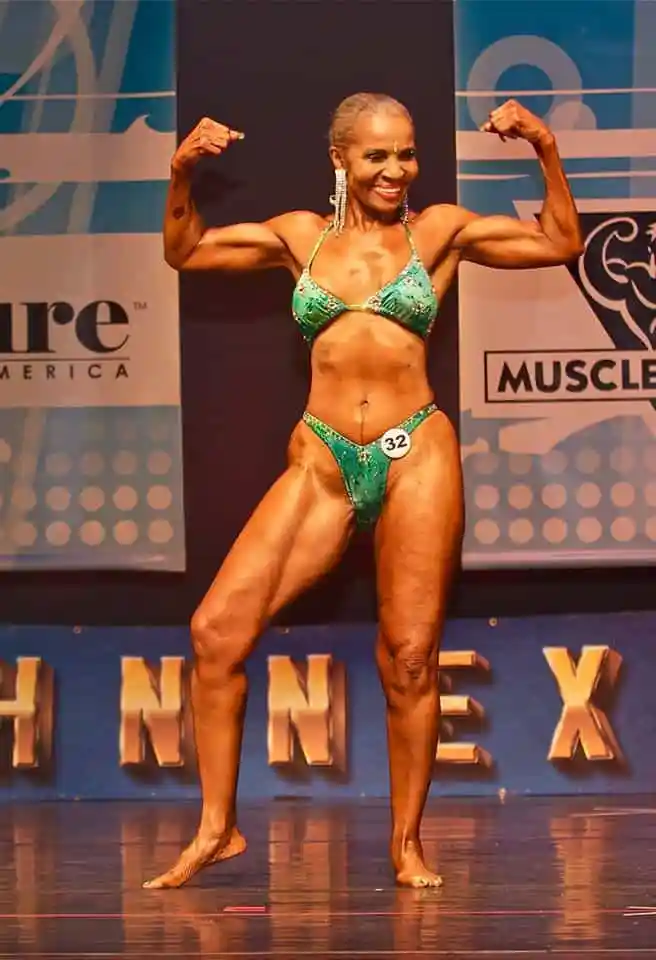Ageing, Fitness and Strength
Most people want to look and feel younger than they are. Some people fear ageing. I often get asked questions like “how do I stay motivated being over 50?”. How do I train ?” “Do I always eat clean?”. We can improve our fitness and strength as we age. We can also begin resistance training at any age.
Ageing is a huge topic that poses more questions than it answers but let’s take a general look at the topic to start with. In a nutshell, staying fit and strong will increase your lifespan. Couple that with good nutrition and you will age in a healthy manner.
Chronological Aging and Physiological Aging
Before I blog on, I want to make a distinction of two types of aging; chronological and physiological (or biological).
Chronological age is based on time and is the same for everyone who is born on the same date. It refers to age in number of years.
Physiological age is the result of many factors, many of which are under your control. It varies from person to person (even if they were born on the same date). It refers to age physical capacity.
The Difference Between the Two
Chronological aging refers to how long you have been alive. Physiological aging, so, describes the state of your body. What’s cool is that with physiological aging many of the factors that impact it are under your control. For example, exercise, nutrition, sleep etc). We all know someone/people who look (and act) outstanding “for their age”. I would argue some look and perform for any age!
Ageing and Physical Decline
Many people see aging as a time of cognitive and physical decline. The elderly are often viewed as: ‘ill, less abled’, impotent’, ‘ugly’, ‘mentally declining’, ‘mentally ill’, ‘useless’, ‘isolated’, ‘poor’ and ‘depressed’. This negative stereotyping of and discrimination against people because they are old is known as “ageism”.[i]
According to the new perspective on aging, mechanisms of successful aging consist of:
- Compensatory responses induced by exercise, good nutrition, and education to restore function
- Interventions to replace deficient function (as represented by replacement therapies).
- Changing of health outcome by modifying risk profiles.
- Prevention of disease.
- Strengthening of social interactions.
With this new aging perspective, the traditional meaning of life span is replaced with health span.
Successful Ageing
The concept of successful aging is popular among both scientists and the general population. Yet there is no one single agreed upon definition for it. There’s even no agreement on the term to be used, with descriptors ranging from successful aging to healthy aging, productive aging, active life expectancy, healthy years, and aging well. [ii]
According to the classic definition[iii], successful aging can be characterised as involving three components”
- Freedom of disease and disability.
- High physical and cognitive functioning
- Social and productive engagement.
Expansion of the Definition
Later refinements to the definition have added psychosocial aspects to the definition. These include self-acceptance, positive relations with others, autonomy, environmental control, purpose in life, and personal growth.[iv]
It has also been suggested that successful aging is a developmental process that can be achieved at any stage in the life span.[v]
Regardless, we all want to have the capacity to thrive and prosper for as long as we live. Well, I know I do. I want to still be hitting the weights room in my nineties! Or at the very least doing water aerobics. 😊
Centenarians Can Teach Us Useful Predictors
Let’s take a look at what our current successful elders are doing to age well. What physiological characteristics do they display? Those who are 100 years old or older, represent an absorbing model for ageing studies. They demonstrate extreme longevity, and at the same time a proportion of them have aged positively. They also have less diseases than the younger elderly.[vi]
It is shown that autonomous centenarians partake in regular exercise, have more frequent intakes of protein and regular sleep patterns, and no history of drinking.[vii]
Other consistent predictors of healthy aging are low blood pressure, low serum glucose, not smoking cigarettes, and not being obese. [viii]Typical of autonomous centenarians are better visual acuity, preserved masticatory ability and living at home.[ix]
They have been healthy and independent for most of their lives and don’t experience a significant functional decline until the very end of their lives.[x]
Centenarians, once considered rare, are now starting to become commonplace. Indeed, they are the fastest growing demographic group of the world’s population, their numbers having roughly doubled every decade since 1950.[xi]
How Can You Delay Ageing?
There are a myriad of things that you can do to help “turn back the biological clock”. A big one, well supported by research is resistance training. Weight training is the fountain of youth.
Your indiscretions and poor decision making add up over lifetime
Beyond the biological effects of aging, much of the illness and disability in the elderly is related to risk factors present at younger ages. If you are in your 30s and think “I will start to worry about that when I hit 50” you’re [xii]wrong. The sooner you start to take care of your health by exercising regularly and eating healthy, the better off you will be when you get older.
Even early age nutrition and exercise habits in kids and teenagers have an impact on the aging process.[xiii] It is shown that healthy lifestyle choices encompassing diet, physical activity, body fat (weight) reduction and stress control can add at least ten years to healthy, good quality, life expectancy.[xiv]
Thus, even if you’re in your 20s or 30s, it is smart to think about the health implications of your current habits and lifestyle.
It is never too late!
If you think “shit it’s all too late for me now” as you have been an avid party goer, even drinker and drugger, you’re wrong! Several studies have shown that improving health related habits and reducing risk factors even at older ages confer much benefits.
Even at old age we have a notable capacity to adapt to regular exercise. Aerobic exercise results in improvements in functional capacity and reduced risk of developing type II diabetes in the elderly.
High-intensity resistance training (above 60% of the 1 repetition maximum) has been demonstrated to cause large increases in strength in the elderly.
Resistance Training Benefits
In addition, resistance training results in significant increases in muscle size in elderly men and women, and has a positive effect on multiple risk factors for osteoporotic fractures in previously sedentary post-menopausal women.
Thus, old age does not decrease the capacity to adapt to a progressive resistance training program, and exercise may minimise or reverse the syndrome of physical frailty.
This is so prevalent among the oldest old.[xv] Even in very elderly 87 year old people resistance exercise training is a workable and effective means of counteracting muscle weakness and physical frailty.[xvi]
Many clinical studies prove that it is never too late to start living healthier and benefit from those changes. While it’s certainly better to start healthy habits at a young age and keep them for a lifetime, for those who have strayed (that is, most people!) nature is remarkably forgiving. Not only can we recover much lost function and decrease risk, but we can actually increase function and health beyond our prior level.
Strength, Fitness, Power and Ageing
The Females:
Let me bring this back to “weight training being the fountain of youth”, I will highlight the local powerlifting scene here in Australia as an example. You have myself and Maria Barba at 53 and 54 respectively, both have looked after our health, not smoked and prioritised fitness. We are unbeatable in our OPEN weight classes, being far stronger than those women 30 years younger.
Murway-Traina is now a world record holder at age 100. She began weight training at age 91.She bench presses 32.5kg’s and deadlifts 75kg’s. This is impressive stuff.
The Males:
You have people like Joe Zollo at the age of 64 pulling a total score of 622.5kg – which is massive. Terrence Titus at age 66 totalling 675kg. And the legendary Jim Ambrose at 70 totalling 455kg.
In the bodybuilding world I had the pleasure of judging Raymond Moon many times. Early on in life he had a huge drinking problem. He turned his life around in his sixties and was competing in bodybuilding until the age of 87. Raymond passed away recently age 90. He added years to his life by resistance training and a healthy lifestyle into his list of values.
There are many more examples I could cite. These people are adding years to their lives, quality as well, and look awesome to top it off. More power to them!
Conclusion
There’s no excuse to treat the aging process itself as a reason for disability and disease at older age. A wealth of studies show that most age related functional declines and disabilities can be prevented with non-aging related lifestyle factors. Such as, exercise and nutrition. A successful old age lies not so much in our fate and genes, as in ourselves. Prioritise your values and choices, Take control, and start adding years to your life.
References:
[i] Rowe JW, Kahn RL. Human aging: usual and successful. Science 1987;237(4811):143-9.
Rowe JW, Kahn RL. Human aging: usual and successful. Science 1987;237(4811):143-9.
Butler RN. What is ‘successful’ aging? Geriatrics 1988;43(5):11, 15.
Vaillant GE, Mukamal K. Successful aging. The American journal of psychiatry 2001;158(6):839-47.
[ii] Looker AC, Orwoll ES, Johnston CC, Jr., Lindsay RL, Wahner HW, Dunn WL, et al. Prevalence of low femoral bone density in older U.S. adults from NHANES III. Journal of bone and mineral research : the official journal of the American Society for Bone and Mineral Research 1997;12(11):1761-8.
[iii] Rowe JW, Kahn RL. Human aging: usual and successful. Science 1987;237(4811):143-9.
Rowe JW, Kahn RL. Successful aging. Aging (Milano) 1998;10(2):142-4.
Rowe JW, Kahn RL. Successful aging. The Gerontologist 1997;37(4):433-40.
[iv] Ryff CD. Successful aging: a developmental approach. The Gerontologist 1982;22(2):209-14.
[v] Ryff CD. Successful aging: a developmental approach. The Gerontologist 1982;22(2):209-14.
[vi] Perls T, Levenson R, Regan M, Puca A. What does it take to live to 100? Mechanisms of ageing and development 2002;123(2-3):231-42.
Ozaki A, Uchiyama M, Tagaya H, Ohida T, Ogihara R. The Japanese Centenarian Study: autonomy was associated with health practices as well as physical status. Journal of the American Geriatrics Society 2007;55(1):95-101.
[vii] Ozaki A, Uchiyama M, Tagaya H, Ohida T, Ogihara R. The Japanese Centenarian Study: autonomy was associated with health practices as well as physical status. Journal of the American Geriatrics Society 2007;55(1):95-101.
[viii] Hitt R, Young-Xu Y, Silver M, Perls T. Centenarians: the older you get, the healthier you have been. Lancet 1999;354(9179):652.
[ix]Ozaki A, Uchiyama M, Tagaya H, Ohida T, Ogihara R. The Japanese Centenarian Study: autonomy was associated with health practices as well as physical status. Journal of the American Geriatrics Society 2007;55(1):95-101.
[x] Hitt R, Young-Xu Y, Silver M, Perls T. Centenarians: the older you get, the healthier you have been. Lancet 1999;354(9179):652.
[xi] . McEwen BS, Wingfield JC. What is in a name? Integrating homeostasis, allostasis and stress. Hormones and behavior 2010;57(2):105-11.
[xii] Hitt R, Young-Xu Y, Silver M, Perls T. Centenarians: the older you get, the healthier you have been. Lancet 1999;354(9179):652.
[xiii] Dwyer J. Starting down the right path: nutrition connections with chronic diseases of later life. The American journal of clinical nutrition 2006;83(2):415S-20S.
[xiv] . Fraser GE, Shavlik DJ. Ten years of life: Is it a matter of choice? Archives of internal medicine 2001;161(13):1645-52.
[xv] Evans WJ. Effects of exercise on body composition and functional capacity of the elderly. The journals of gerontology. Series A, Biological sciences and medical sciences 1995;50 Spec No:147-50.
[xvi] Fiatarone MA, O’Neill EF, Ryan ND, Clements KM, Solares GR, Nelson ME, et al. Exercise training and nutritional supplementation for physical frailty in very elderly people. The New England journal of medicine 1994;330(25):1769-75.


